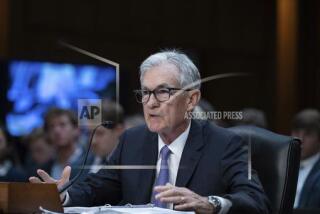4 Fed Presidents Back Move for Zero Inflation
- Share via
WASHINGTON — Four Federal Reserve Bank presidents told Congress on Tuesday that the current rate of inflation is too high and voiced strong support for a bill that supports the central bank’s efforts to attain zero inflation.
They said the benefit would outweigh the short-term economic pain that such a move would produce.
“Inflation may well re-accelerate in the absence of a clear signal to the public that Congress fully supports the Federal Reserve Board’s commitment to lower inflation,” said Robert P. Black, president of the Federal Reserve Bank of Richmond, Va.
Black and the three other presidents endorsed a resolution proposed by Rep. Stephen L. Neal (D-N.C.), chairman of the House Banking monetary policy subcommittee. If passed by Congress, it would not legally mandate the Fed to reduce inflation to zero over the five-year period mentioned in the legislation. Rather, the Fed would be encouraged to aim for zero inflation.
The resolution is also supported by Federal Reserve Board Chairman Alan Greenspan, who along with other monetary policy-makers is being pressured by the Bush Administration to stimulate economic growth through lower interest rates.
But White House economic adviser Michael J. Boskin said at a news conference Tuesday that he did not favor the bill.
“I do not believe that it makes sense for Congress to try to micro-manage the Federal Reserve,” said Boskin, chairman of the President’s Council of Economic Advisers.
The nation’s monetary policy is set mainly by the Federal Open Market Committee, which is composed of the seven-member Federal Reserve Board in Washington and the presidents of the 12 regional Federal Reserve Banks.
The bank presidents told Neal’s subcommittee that the open market committee was committed to an anti-inflationary policy but said it would be bolstered by a clear vote of support from Congress.
Robert T. Parry, president of the Federal Reserve Bank of San Francisco, said work done by his staff indicates that a recession is not necessary to bring inflation down to zero by 1994.
But the unemployment rate, now at 5.3%, could rise to between 6.75% and 7.75%, he said. At the same time, growth, as measured by the gross national product, would have to be 1 to 2 percentage points slower than the 2.5% to 3% growth that the bank presidents said was the fastest achievable without accelerating inflation.
More to Read
Get the L.A. Times Politics newsletter
Deeply reported insights into legislation, politics and policy from Sacramento, Washington and beyond. In your inbox twice per week.
You may occasionally receive promotional content from the Los Angeles Times.









